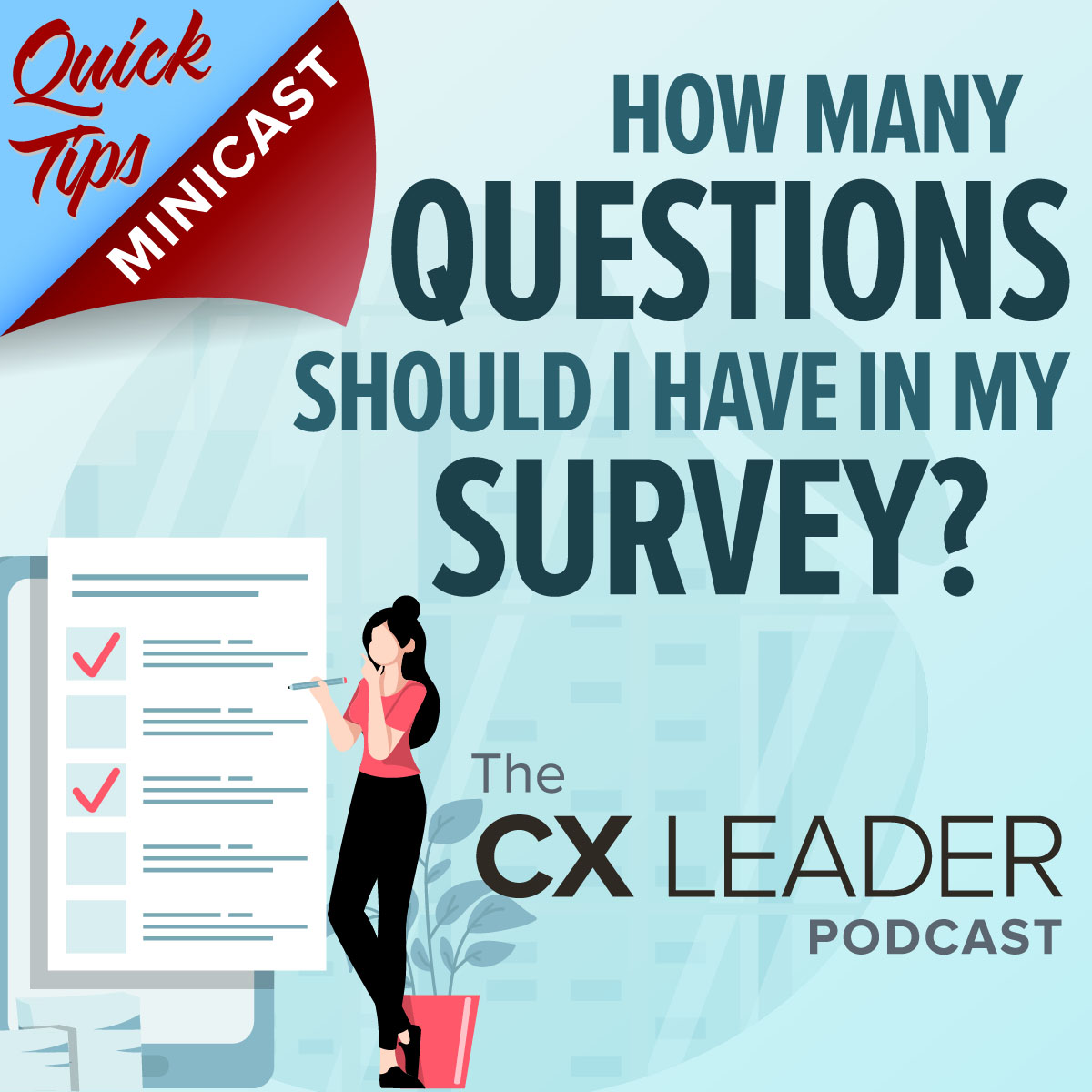
How many questions should I have in my survey?
Release Date:

You’re ready to get going on gathering customer feedback, but there’s always that looming question: what will we ask them and how much is too much survey? On this edition of The CX Leader Quick Tips Minicast, Walker expert Molly Work gives helpful advice on how to determine the right amount of questions to ask in a survey.

Molly Work
Walker
Connect with Molly
Transcript
The CX Leader Podcast Quick Tips: "How many questions should I have in my survey?": Audio automatically transcribed by Sonix
The CX Leader Podcast Quick Tips: "How many questions should I have in my survey?": this wav audio file was automatically transcribed by Sonix with the best speech-to-text algorithms. This transcript may contain errors.
Chris:
Hello everyone, I'm Chris Higgins and welcome to the CX Leader Quick Tips Minicast, where Walker experts take a few minutes to give you helpful advice on how to improve your XM programs. Joining me on this episode of the minicast is Molly Work, an Associate Vice president in our client services area here at Walker. Molly, thanks for being on the show.
Molly:
Yeah, Chris, thanks for having me.
Chris:
So what's your quick tip for our listeners?
Molly:
So today we are going to talk about what is the right length or number of questions for my survey. And the number that I'm going to give you is two. And no I don't mean two questions, but instead two perspectives, the respondents perspective and then how you're going to be taking action based on what you've heard. So let's start with the respondents perspective. In general, modern survey best practices have really been shifting towards deploying shorter and more actionable surveys. So if you think about it, when we're measuring customer experience, the survey taking process in and of itself is an experience for our respondents. So put yourself in your respondents shoes. Think about when you receive a customer experience survey. What does that ideal survey taking experience look like for you? So it probably means just a handful of quick, easy to understand and meaningful questions about what your experience was. Concise and thoughtful surveys are also more likely to increase your response rate and completion rates, and they provide an overall better survey taking experience for respondents. Now, I want you to put a different hat on that of your internal business functional teams. We're going to be using this data to drive improvements. We know that one of the most important things when collecting experience data is that we are listening to what we've heard and taking action on it. So the data we collect should drive performance improvement initiatives. Before that survey goes out, ask yourself, how is my organization going to use this information to improve customer experience? Who's going to review this data and how will they use it to improve the experiences across the ecosystem? And how will we use this data to measure the effectiveness of those improvement initiatives? And if you don't know the answer to many of those questions, it probably means refining your survey before you launch. Surveys, really, they're not just about checking a box, but instead about hearing the voices of those that we serve.
Chris:
So what you're saying is we really want our surveys to be as short as possible, but ask what you need?
Molly:
Exactly. Essentially, you want your survey to be as short as possible and as long as necessary so that you can drive action on that data. An ideal survey length, it really depends on a lot of factors. For example, what was the impetus of the survey? How does the survey drive your organizational or your customer experience goals? What customer persona are you targeting with your survey? What type of survey are you deploying? Is it a broader relationship survey or a touchpoint survey? What methodology are you using to collect the data? Is it SMS, text, email, IVR? Et cetera. And are you asking questions that your team is going to be activating, monitoring and using to drive those improvements? So in short, Chris, there's no magic number of questions when developing a survey. But if you really need something to target for transactional surveys, I would aim for a three minute take time, five minutes at the absolute maximum. And for those longer annual relationship surveys, those can be longer. But target keeping even those to less than ten minutes. And the shorter the better. And keep in mind those two different perspectives.
Chris:
I really like how you put that into the perspective of not just number of questions, but how long the respondent is going to take to complete the survey. In other words, thinking of it not necessarily from a numbers perspective, but an experience perspective. So what are a few other quick tips to help people make those specific time goals and to pare down those surveys?
Molly:
Yeah, absolutely. I probably have two tips for you. So number one, go through your survey, take out any questions they'll be already know the answer to. For example, do we have that information in our contact database or elsewhere in the organization that we can tie into our survey results. So for example, the region they're located in and what product they purchased, take those questions out of the survey and use the data that you already have to get that information. The second, ask yourself how actionable the data is going to be for each question in your survey. If you're asking a question about something the organization won't be able to action or can't do anything about, it might be worth removing. Each question in your survey should have a why. Why are we asking this? And if the answer is well, it might be nice to have, then it's probably something we can cut. Save your survey real estate for the questions that are really going to help drive change. Remember, design with the end in mind. Taking action based on what you've heard. Keep your surveys as short as possible and as long as necessary.
Chris:
Great advice. Thank you Molly for your quick tip. And if you want to listen to more great advice, go to cxleaderpodcast.com and be sure to subscribe to the show and if you have a question or would like to hear more on a particular topic, send us an email at podcast@walkerinfo.com. Thanks for listening.
Sonix is the world’s most advanced automated transcription, translation, and subtitling platform. Fast, accurate, and affordable.
Automatically convert your wav files to text (txt file), Microsoft Word (docx file), and SubRip Subtitle (srt file) in minutes.
Sonix has many features that you’d love including world-class support, transcribe multiple languages, advanced search, upload many different filetypes, and easily transcribe your Zoom meetings. Try Sonix for free today.





